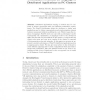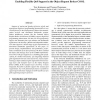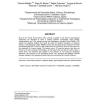226 search results - page 2 / 46 » Flexible Abstraction Layers for VR Application Development |
VRST
1997
ACM
13 years 9 months ago
1997
ACM
Developing virtual reality (VR) applications which enable actual work over a period of time requires optimization of the most basic interactions, such as object manipulation, so t...
NPC
2007
Springer
13 years 11 months ago
2007
Springer
Abstract. Distributed applications running on clusters may be composed of several components with very different performance requirements. The FlowVR middleware allows the develop...
ICDCSW
2000
IEEE
13 years 10 months ago
2000
IEEE
Support of end-to-end Quality-of-Service (QoS) and ate high-level programming abstractions are two crucial factors for the development of future telecommunication services and dis...
ICCSA
2005
Springer
13 years 11 months ago
2005
Springer
Abstract. The last advances in commodity hardware have allowed users of immersive visualization to create high-performance systems using a set of interconnected computers. These sy...
PSYCHNOLOGY
2006
13 years 5 months ago
2006
Most of the Virtual Environments (VE) currently available in the field of psychological treatments are designed to solve a specific problem (acrophobia, flying phobia, claustropho...



